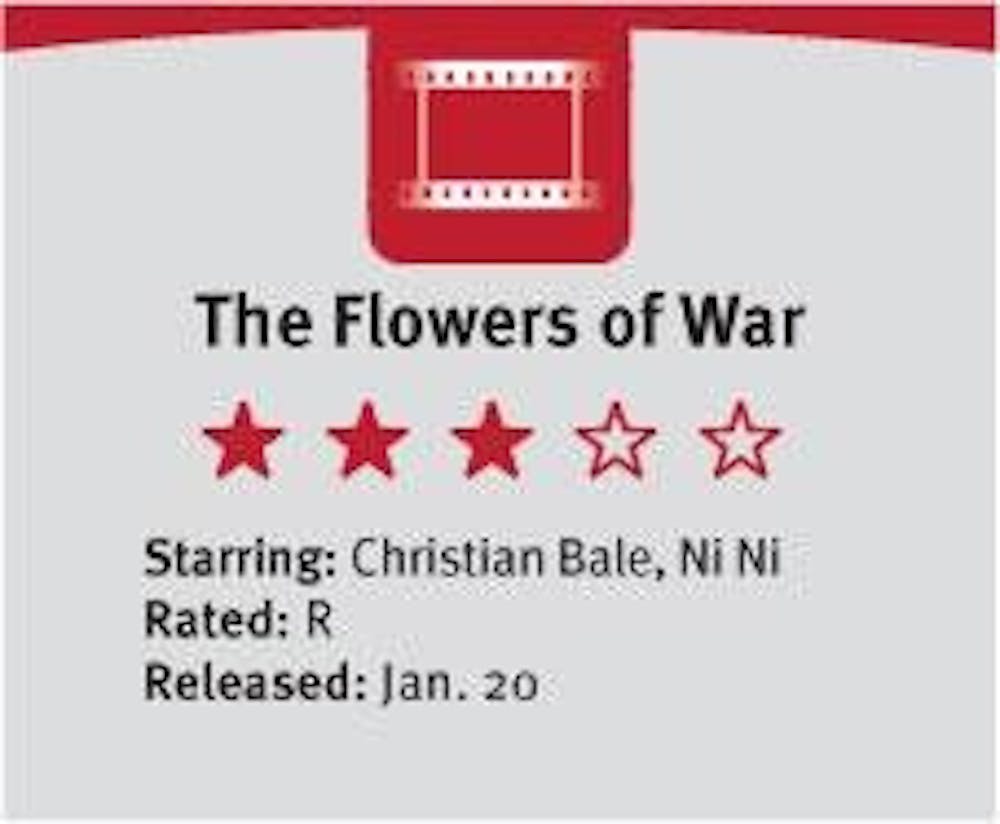The Flowers of War revisits Nanking

Arguably the most anticipated Chinese production this year, The Flowers of War is a poignant retelling of the Nanking Massacre that fails to convey genuine pathos. Praised for its depiction of a pivotal point in Chinese history – the Rape of Nanking – the film has been nominated for Best Foreign Language Film at the 84th Academy Awards and received a nomination for the 69th Golden Globe Awards. With a budget of $94 million, the movie is the most expensive Chinese production to date. The film stars Christian Bale (The Dark Knight), newcomer Ni Ni and Tong Dawei (Lost in Beijing).
The story is set in Nanking (now Nanjing) during the invasion by Japanese troops during the Second Sino-Japanese War. A group of escapees, finding sanctuary in a church compound, risk their lives as they struggle to survive the plight and persecution brought on by the 1937 invasion. The screenplay was written by Liu Heng (Tie Ren) and is based on the novel The 13 Women of Nanjing by Gelin Yan. The film adds a nice touch of historical accuracy by using English, Mandarin and Japanese with English subtitles. The result of this multi-lingual production is a complete immersion into the narrative.
No stranger to spectacle, director Yimou Zhang is known for organizing the opening and closing ceremonies of the 2008 Summer Olympics in Beijing and directing House of the Flying Daggers (2004). In Flowers, Zhang dramatizes a tale of brutality and emotional devastation. The lurid beauty of the visuals produces a truly touching movie.
The film is a good counterpart to the earlier-released Chinese film, City of Life and Death (2009). In City, director Chuan Lu creates a memorable depiction of Nanking's decimation using a broader canvas to touch upon many aspects of the massacre. In contrast, Zhang uses a finer brush in Flowers, focusing on the few foreigners living in the city at the time of the Japanese invasion.
Innocence versus experience is an undeniably strong theme. The girls' tender adolescence heightens its impact, especially given the historical facts. The "Rape of Nanking" is more than a figurative description: The Japanese invaders committed horrendous sexual assaults against the female population. In Flowers, the girls' safety becomes the paramount concern of the survivors holed up in the cathedral.
Flowers is not without faults. Zhang does not take a strong stance on the events and fails to settle on a tone or a compelling–or even coherent–narrative. Other recent Chinese films have displayed more sentimental nationalism, jingoism and demonization of the Japanese enemy. The director's distance from the massacre is embodied in his decision to set most of the film within the compound of a fictional European church. The result is an artificial, back-lot atmosphere; the opening scenes, set in the streets, take place in an actual fog of war, with smoke isolating the characters from the real world of Nanking. Unfortunately, Zhang uses the events of 1937 merely as inspiration for his Hollywood-targeted melodrama.
Flowers will appeal to historical buffs and Bale fans. The movie lacks in honesty and character but is sure to be a strong Hollywood hit.
More from The Rice Thresher

Over 1,000 students petition against new meal plan
When Konstantin Savvon opened the Housing and Dining email announcing the new unlimited meal plan, he was instantly concerned about the impact on off-campus students like himself.

Rice football wins season opener under new coach
For the first time since 2018, Rice football opened its season with a victory. Scott Abell was soaked with yellow Powerade following a 14-12 win on the road Saturday against the University of Louisiana at Lafayette, which won 10 games and made it to the Sun Belt Conference championship last season.

Acting like an athlete: Rice basketball alum takes on Broadway
Underneath Chadd Alexander’s Broadway costume, there’s ankle tape and wrist braces — same protective gear he wore as a walk-on basketball player at Rice, though now he’s performing eight shows a week in the ensemble of “Harry Potter and the Cursed Child” instead of running conditioning drills in Tudor Fieldhouse.

Please note All comments are eligible for publication by The Rice Thresher.